新版财政学名词解释
财政学

3、从价税:是指以课税对象的价格为依据,按一定比例计征的税种。如关税、增值税、营业税。
二、填空题
1、财政的职能可以概括为:资源配置职能、收入分配职能、经济稳定职能。
由于现实中时常存在以上“失灵”现象,因此市场运行的结果将会偏离资源配置与收入分配的理想状态。要纠正市场失灵,个人与经济组织只是无能为力的,只能依靠政府的宏观财政活动,以得市场方式来解决。因此,市场失灵的存在不仅证明了政府存在的必要性,同时也为确定政府财政活动的范围提供了依据。
A. 从量税 B. 从价税
C. 价内税 D.可以分为(AB)。
A. 单式预算 B. 复式预算
第一、市场不能提供公共产品和服务。由于公共产品具有的非分割性、非竞争性、非排斥性、非盈利性等特征,决定了公共产品或服务不可能以等价交换的形式通过市场感渠道满足,只有通过由政府提供的渠道来解决。
第二、无法消除外部经济效应。外部效应是指某个人或经济组织的行为活动影响了他人或经济组织,却没有为之承应有的成本或获得应有的收益。这些外部效应的存在,市场价格机制无法解决,只能由政府运用财政手段(征税和提供补贴的方式)来解决。
第五、宏观经济失调。由于市场机制中价格信号在诸如劳动力等重要市场上并不具有伸缩自如、灵活反应的调节能力;加以不同经济主体在现实经济利益上具有竞争性和排他性,也会削弱市场的自发调节能力,不能保证供求平衡。于是,失业、通货膨胀与周期性的经济波动重复出现,这需要政府通过运用财政手段来干预经济运行,使其健康发展
3、简述分税制的主要内容。
财政学名词解释

一.名词解释1.财政:国家或政府的分配行为。
2.公共财政:是为市场提供公共服务的财政,是社会公众或人民大众的财政,是与市场经济相适应的财政制度。
3.混合经济:公共经济与私人经济的有机混合体。
4.市场失效:虽然满足充分竞争这一条件,市场机制就能够实现资源的最佳配置,但仍存在若干市场无法有效配置资源和正常发挥作用的现象。
5.帕累托效率(帕累托最优):在既定的个人偏好、生产技术和要素投入量下,除非以他人处境的变差为代价,当一个社会对资源的任何重新配置都已不可能使某个人的处境变得更好,则此时社会资源配置处于最佳效率状态中。
帕累托改善:在同样的前提条件下,如果一个社会能够通过资源的重新配置,在使某个人的处境变好的同时,却不导致任何他人的处境变差,则此时的社会资源配置效率就提高了。
6.公共产品:具有共同消费性质的服务。
7.外溢性:人们的行为对他人产生的利益或成本影响。
8.财政职能:政府应当履行的经济职责和任务。
9.囚徒困境:从个人利益出发的两个独立行动的当事人,是如何注定不会相互合作,并将给双方带来极大损失的负和博弈。
10.公共选择:人们通过政治过程来决定公共产品的需求、供给和产量,从而把个人偏好转化为集体决策的一种机制或过程,它是对资源配置的非市场决策机制。
11.经纪人假设:现实中的人是利己地、理性地追求自身效用或利益最大化的。
12.多数同意规则:一项决策须经半数以上人赞成才能获得通过的一种投票规则。
13.投票悖论:虽然单个个人的偏好是一致的,但在多数票规则下却得不出一致的集体偏好。
14.寻租:在政府管制行为下人为产生的租金的追求。
15.政府失效:政府行为或财政决策过程不能有效地配置资源,或在公平和稳定职能上不能很好地发挥作用。
16.购买性支出:政府为了执行各种政府职能,用于购买所需的商品和劳务的支出转移性支出:政府单方面的、无偿的资金支付。
17.瓦格纳法则:随着经济中人均收入的增长,财政支出的相对规模也增长了。
财政学名词解释和简答答案
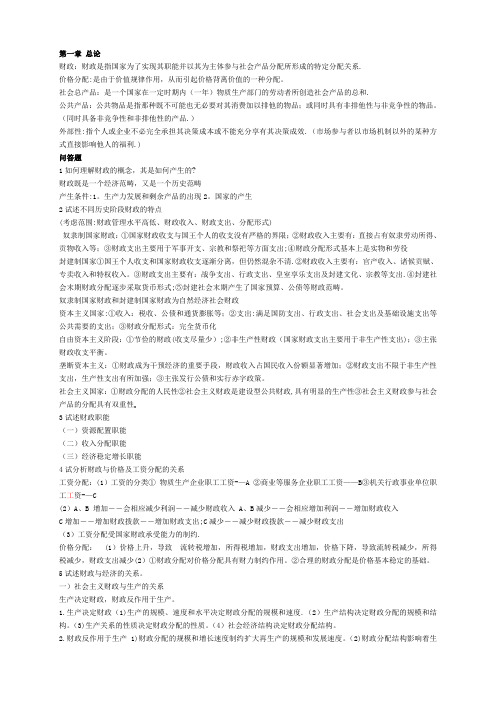
第一章总论财政:财政是指国家为了实现其职能并以其为主体参与社会产品分配所形成的特定分配关系.价格分配:是由于价值规律作用,从而引起价格背离价值的一种分配。
社会总产品:是一个国家在一定时期内(一年)物质生产部门的劳动者所创造社会产品的总和.公共产品:公共物品是指那种既不可能也无必要对其消费加以排他的物品;或同时具有非排他性与非竞争性的物品。
(同时具备非竞争性和非排他性的产品.)外部性:指个人或企业不必完全承担其决策成本或不能充分享有其决策成效.(市场参与者以市场机制以外的某种方式直接影响他人的福利.)问答题1如何理解财政的概念,其是如何产生的?财政既是一个经济范畴,又是一个历史范畴产生条件:1。
生产力发展和剩余产品的出现2。
国家的产生2试述不同历史阶段财政的特点(考虑范围:财政管理水平高低、财政收入、财政支出、分配形式)奴隶制国家财政:①国家财政收支与国王个人的收支没有严格的界限;②财政收入主要有:直接占有奴隶劳动所得、贡物收入等;③财政支出主要用于军事开支、宗教和祭祀等方面支出;④财政分配形式基本上是实物和劳役封建制国家①国王个人收支和国家财政收支逐渐分离,但仍然混杂不清.②财政收入主要有:官产收入、诸候贡赋、专卖收入和特权收入。
③财政支出主要有:战争支出、行政支出、皇室享乐支出及封建文化、宗教等支出.④封建社会末期财政分配逐步采取货币形式;⑤封建社会末期产生了国家预算、公债等财政范畴。
奴隶制国家财政和封建制国家财政为自然经济社会财政资本主义国家:①收入:税收、公债和通货膨胀等;②支出:满足国防支出、行政支出、社会支出及基础设施支出等公共需要的支出;③财政分配形式:完全货币化自由资本主义阶段:①节俭的财政(收支尽量少);②非生产性财政(国家财政支出主要用于非生产性支出);③主张财政收支平衡。
垄断资本主义:①财政成为干预经济的重要手段,财政收入占国民收入份额显著增加;②财政支出不限于非生产性支出,生产性支出有所加强;③主张发行公债和实行赤字政策。
财政学名词解释
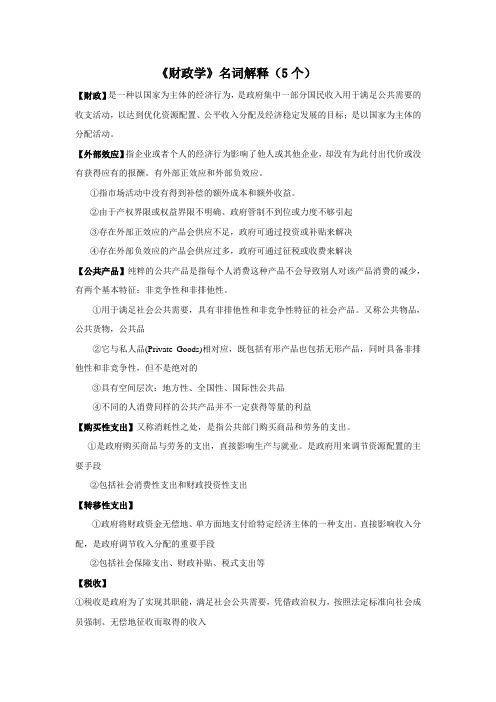
《财政学》名词解释(5个)【财政】是一种以国家为主体的经济行为,是政府集中一部分国民收入用于满足公共需要的收支活动,以达到优化资源配置、公平收入分配及经济稳定发展的目标;是以国家为主体的分配活动。
【外部效应】指企业或者个人的经济行为影响了他人或其他企业,却没有为此付出代价或没有获得应有的报酬。
有外部正效应和外部负效应。
①指市场活动中没有得到补偿的额外成本和额外收益。
②由于产权界限或权益界限不明确、政府管制不到位或力度不够引起③存在外部正效应的产品会供应不足,政府可通过投资或补贴来解决④存在外部负效应的产品会供应过多,政府可通过征税或收费来解决【公共产品】纯粹的公共产品是指每个人消费这种产品不会导致别人对该产品消费的减少,有两个基本特征:非竞争性和非排他性。
①用于满足社会公共需要,具有非排他性和非竞争性特征的社会产品。
又称公共物品,公共货物,公共品②它与私人品(Private Goods)相对应,既包括有形产品也包括无形产品,同时具备非排他性和非竞争性,但不是绝对的③具有空间层次:地方性、全国性、国际性公共品④不同的人消费同样的公共产品并不一定获得等量的利益【购买性支出】又称消耗性之处,是指公共部门购买商品和劳务的支出。
①是政府购买商品与劳务的支出,直接影响生产与就业。
是政府用来调节资源配置的主要手段②包括社会消费性支出和财政投资性支出【转移性支出】①政府将财政资金无偿地、单方面地支付给特定经济主体的一种支出。
直接影响收入分配,是政府调节收入分配的重要手段②包括社会保障支出、财政补贴、税式支出等【税收】①税收是政府为了实现其职能,满足社会公共需要,凭借政治权力,按照法定标准向社会成员强制、无偿地征收而取得的收入②具有强制性、无偿性和固定性。
③三性不是绝对的,而是相对的。
三性密切联系,要同时具备。
是税收区别于其他财政收入的形式特征。
【税收转嫁】①纳税人通过提价或压价方式,将部分或全部税负转移给购买者或供应商的一种经济现象。
财政学 名词解释及期末重点
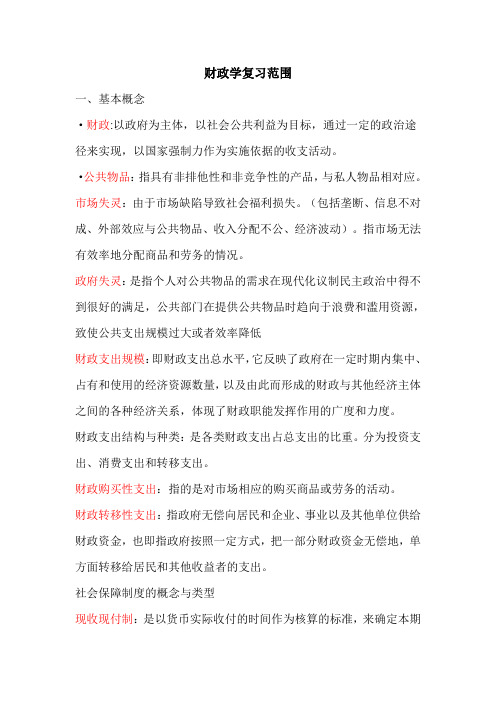
财政学复习范围一、基本概念·财政:以政府为主体,以社会公共利益为目标,通过一定的政治途径来实现,以国家强制力作为实施依据的收支活动。
·公共物品:指具有非排他性和非竞争性的产品,与私人物品相对应。
市场失灵:由于市场缺陷导致社会福利损失。
(包括垄断、信息不对成、外部效应与公共物品、收入分配不公、经济波动)。
指市场无法有效率地分配商品和劳务的情况。
政府失灵:是指个人对公共物品的需求在现代化议制民主政治中得不到很好的满足,公共部门在提供公共物品时趋向于浪费和滥用资源,致使公共支出规模过大或者效率降低财政支出规模:即财政支出总水平,它反映了政府在一定时期内集中、占有和使用的经济资源数量,以及由此而形成的财政与其他经济主体之间的各种经济关系,体现了财政职能发挥作用的广度和力度。
财政支出结构与种类:是各类财政支出占总支出的比重。
分为投资支出、消费支出和转移支出。
财政购买性支出:指的是对市场相应的购买商品或劳务的活动。
财政转移性支出:指政府无偿向居民和企业、事业以及其他单位供给财政资金,也即指政府按照一定方式,把一部分财政资金无偿地,单方面转移给居民和其他收益者的支出。
社会保障制度的概念与类型现收现付制:是以货币实际收付的时间作为核算的标准,来确定本期收入和支出的一种会计核算方法。
税收支出:是指国家为了实现特定的政策目标,通过制定与执行特殊的税收法律条款,给子特定纳税人或纳税项目以各种税收优惠待遇,以减少纳税人税收负担而形成的一种特殊的财政支出。
税收种类:税种指一个国家税收体系中的具体税收种类,是基本的税收单元。
税收主要分为消费税、增值税、营业税和所得税等几类。
负税人:实际负担税款的单位和个人(如消费者)。
扣缴义务人:负有代纳税人扣留税款,并缴纳税款义务的单位和个人。
课税对象:(税收客体):指税法规定的征税的目的物,是征税的根据。
计税依据:征税目的的计量标准,即国家征税时的实际依据。
累计税率:是按课税对象数额的大小,划分若干等级,每个等级由低到高规定相应的税率。
财政学名词解释精编版

1.财政所谓财政,就是为了满足社会公共需要,弥补市场失灵,以国家为主体参与的的社会总产品分配。
他既是政府集中分配行为,又是国家宏观调控的重要工具。
•2.公共物品(p19)由国家机关和政府部门—公共部门提供用来满足社会公共需要的商品和服务称为公共物品。
3.非排他性(p20)公共物品的第一个特征,及一些人想享用公共物品带来的利益而不能排除其他一些人同时从公共物品中受益。
4.非竞争性公共物品的第二个特征,及消费者的增加不引起生产成本的增加或者说提供公共物品的边际成本为零。
5.购买性支出(财政一手付出了资金,另一手相应也购得了商品和服务,并运用这些商品和服务实现国家的职能6.转移性支出财政付出了资金,却无任何所得。
表现为资金是无偿的单方面的转移。
7.财政支出增长边际倾向(p84)以MGP表示,该指标表明财政支出增长额与GDP增长额之间的关系,即GDP每增加一个单位的同时财政支出增加多少,用公式表示为MDP=▲G/▲GDP8. 行政管理支出是财政用于国家各级权力机关,行政机关和外事机构行使其职能所需的费用,包括行政支出、公安支出、国家安全支出、司法检察机关支出和外交支出9.财政补贴(p172)一种影响相对价格结构,从而可以改变资源配置结构、供给结构和需求结构的政府无偿支出。
主要分为物价补贴和企业亏损补贴,此外政府还提供某些专项补贴、财政贴息、税收支出。
10.税收豁免(p181)指在一定时期内,对纳税人的某些所得项目会所得来源不予课税,会对其某些活动不列入课税范围等,以豁免其税收负担。
11.税收抵免(p182)指允许纳税人从某种合乎奖励规定的支出中,以一定比率从其应纳税额中扣除,以减轻其税负。
12.加速折旧(p183)这是指在国家资产使用年限的初期提列较多的折旧。
采用这种折旧方法可以在国家资产的使用年限内早一些得到折旧费和减免税的税款13.累进税率(p217)它是按课税对象数额的大小划分若干等级,每个等级由低到高规定相应的税率,课税对象数额越大,税率越高,数额越小,税率越低。
财政学(名词解释大全)
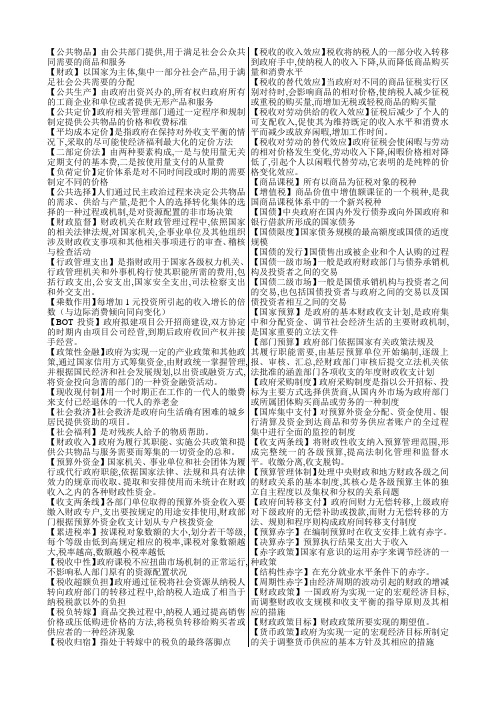
【公共物品】由公共部门提供,用于满足社会公众共同需要的商品和服务【财政】以国家为主体,集中一部分社会产品,用于满足社会公共需要的分配【公共生产】由政府出资兴办的,所有权归政府所有的工商企业和单位或者提供无形产品和服务【公共定价】政府相关管理部门通过一定程序和规制制定提供公共物品的价格和收费标准【平均成本定价】是指政府在保持对外收支平衡的情况下,采取的尽可能使经济福利最大化的定价方法【二部定价法】由两种要素构成,一是与使用量无关定期支付的基本费,二是按使用量支付的从量费【负荷定价】定价体系是对不同时间段或时期的需要制定不同的价格【公共选择】人们通过民主政治过程来决定公共物品的需求、供给与产量,是把个人的选择转化集体的选择的一种过程或机制,是对资源配置的非市场决策【财政监督】财政机关在财政管理过程中,依照国家的相关法律法规,对国家机关,企事业单位及其他组织涉及财政收支事项和其他相关事项进行的审查、稽核与检查活动【行政管理支出】是指财政用于国家各级权力机关、行政管理机关和外事机构行使其职能所需的费用,包括行政支出,公安支出,国家安全支出,司法检察支出和外交支出。
【乘数作用】每增加1元投资所引起的收入增长的倍数(与边际消费倾向同向变化)【BOT投资】政府拟建项目公开招商建设,双方协定的时期内由项目公司经营,到期后政府收回产权并接手经营。
【政策性金融】政府为实现一定的产业政策和其他政策,通过国家信用方式筹集资金,由财政统一掌握管理,并根据国民经济和社会发展规划,以出资或融资方式,将资金投向急需的部门的一种资金融资活动。
【现收现付制】用一个时期正在工作的一代人的缴费来支付已经退休的一代人的养老金【社会救济】社会救济是政府向生活确有困难的城乡居民提供资助的项目。
【社会福利】是对残疾人给予的物质帮助。
【财政收入】政府为履行其职能、实施公共政策和提供公共物品与服务需要而筹集的一切资金的总和。
【预算外资金】国家机关、事业单位和社会团体为履行或代行政府职能,依据国家法律、法规和具有法律效力的规章而收取、提取和安排使用而未统计在财政收入之内的各种财政性资金。
财政学名词解释(大全5篇)

财政学名词解释(大全5篇)第一篇:财政学名词解释第一章和第二章1.外部效应:一个厂商从事某项经济活动给他人带来利益或损失的现象2.公共物品:由国家或政府部门---公共部门提供用来满足社会社会公共需要的商品和服务3.资源配置:广义的理解可以是指社会总产品的配置,狭义地理解可以是指生产要素的配置。
4.财政:财政是一种经济行为或经济现象,这种经济行为和经济现象的主体是国家或政府,因而财政是一种国家或政府的经济行为。
5.公共定价:政府相关管理部门通过一定程序和规则提供公共物品的价格和收费标准,即公共物品价格和收费标准的确定就是公共定价。
第三章1.购买性支出:直接表现为政府购买商品和服务的活动,包括购买日常政务活动所需的或用于国家投资所需的商品和服务的支出。
2.转移性支出:直接表现为资金无偿的、单方面的转移。
这类支出主要有补助、捐赠支出和债务利息支出。
3.财政支出增长弹性系数:以Eg表示。
财政支出增长弹性系数是指财政支出增长率与GDP增长率之比。
弹性系数大于1,表明财政支出增长速度快于GDP增长速度。
4.财政支出增长边际倾向:以MGP表示。
该指标表明财政支出增长额与GDP增长额之间的关系,即GDP每增加一个单位的同时财政支出增加多少,或财政支出增长额占GDP增长额的比例。
5.瓦格纳法则:随着人均收入的提高,财政支出占GDP的比重也相应提高。
6.资本—劳动力比率最大化标准:是指政府投资应选择使边际人均投资额最大化的投资项目。
7.就业创造标准:是指政府应当选择单位投资额能够动员最大数量劳动力的项目。
第四章第五章1.社会消费性支出:是政府直接在市场上购买并消耗商品和五福所形成的的支出,是购买性支出的重要组成部分,是国家执行其政治和社会职能的财力保证2.财政投资性支出:是以政府为主体,将其从社会产品或国民收入中筹集起来的财政资金用于国民经济各部门的一种集中性、政策性投资。
是财政支出中的重要组成部分3.基础设施:狭义的基础设施,是指经济社会活动的公共设施,主要包括交通运输、通信、水利、供电、机场、港口、桥梁和城市供排水、供气等。
(完整word版)财政学名词解释及简答题

(完整word版)财政学名词解释及简答题财政学名词解释经济建设费:经济建设费是中国财政预算支出的主要部分,体现了中国社会主义财政的生产建设性。
主要包括基本建设支出、企业挖潜改造资金、科技三项费用、支援农村生产支出、国家物资储备支出、城市维护费、地质勘探费、支援经济不发达地区发展资金、增拨企业流动资金、商业部门简易建设支出等。
社会文教费:在财政学中是指涉及社会和文教领域公共需要必须支出的费用,在我国一般称之为社会文教事业费,主要包括:文化、教育、科学、卫生、出版、通讯、广播、图书、文物、体育、地震、海洋、计划生育等方面的人员经费、业务经费、专项经费、培训经费等。
社会消费性支出:是政府直接在市场上购买并消耗商品和服务所形成的支出,是购买性支出的重要组成部分,是国家执行其政治和社会职能的财力保证。
行政管理费:行政管理费是指国家财政用于各级国家权力机关、国家行政机关、国家审判机关、国家检察机关以及外事机构、重要党派团体行使职能所需的经费支出。
文科卫支出:文科卫支出是文化、教育、卫生支出的简称。
文教科学卫生诸项事业的发展在现代经济发展中发挥着越来越大的决定性作用,但并不是说用于这方面的支出现在是生产性的了。
根据马克思关于生产劳动和非生产劳动的科学划分,文科卫事业费支出仍应归入非生产性的范围。
社会保障制度:由法律规定了的、按照某种确定的规则是实施的社会保障政策和措施体系。
现收现付制:以同一个时期正在工作的一代人的缴费来支付已经退休的一代人的养老金的保险财务模式。
它根据每年养老金的实际需要,从工资中提取相应比例的养老金,本期征收,本期使用,不为以后使用提供储备。
财政补贴:财政补贴是一种转移性支出。
从政府角度看,支付是无偿的;从领取补贴者角度看,意味着实际收入的增加,经济状况较之前有所改善。
财政贴息:政府提供的一种较为隐蔽的补贴形式,即政府代企业支付部分或全部贷款利息,其实质是向企业成本价格提供补贴. 政府为支持特定领域或区域发展,根据国家宏观经济形势和政策目标,对承贷企业的银行贷款利息给予的补贴。
财政学名词解释

财政学名词解释
1. 财政学(Public finance):研究政府在收入、支出和债务方面
的决策和行为的学科,旨在研究如何在有限的资源下实现公共利益
和经济效率。
2. 财政政策(Fiscal policy):政府通过调整税收和支出来影响经
济活动和实现经济目标的政策。
它可以用来刺激经济增长、控制通胀、调整收入分配等。
3. 税收(Taxation):政府从个人、企业等组织收取的强制性付款,用于满足公共需求和提供公共服务。
4. 支出(Government expenditure):政府为实现公共利益而进
行的资源支出,包括社会福利、公共设施建设、教育、国防等领域。
5. 财政赤字(Fiscal deficit):指政府在一定时期内支出超过收入
的情况,需要通过借贷或其他方式来弥补,导致财政状况不稳定。
6. 财政稳定(Fiscal stability):指在一定时期内,政府的收入和
支出能够保持平衡,避免财政赤字或财政盈余过大,以确保经济的
稳定发展。
7. 经济效率(Economic efficiency):指资源的分配和利用能够最大程度地满足社会需求,实现最佳的资源配置和产出。
8. 税基(Tax base):指税收征收的对象,如个人收入、企业利润、消费商品等,对于税收的确定和征收起着重要的作用。
9. 公共物品(Public goods):指无法排除非付费人员使用和使用一个人不会减少其他人可用性的物品和服务,如国防、公共道路等。
10. 纳税者弹性(Taxpayer elasticity):指纳税人对税收变化的敏感程度,即纳税人对税收压力的变化作出的回应。
财政学名词解释
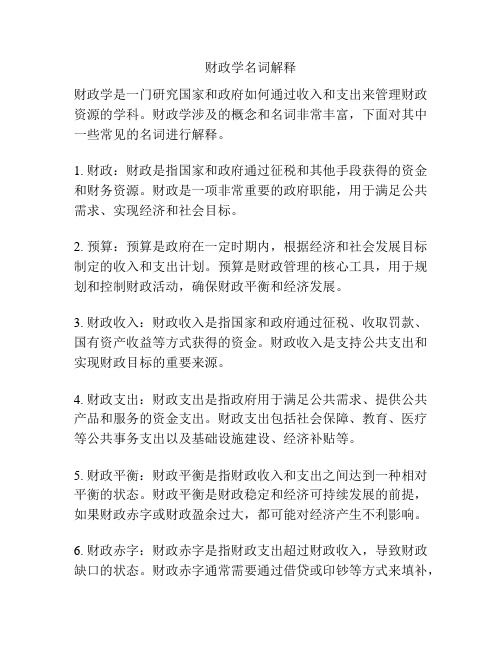
财政学名词解释财政学是一门研究国家和政府如何通过收入和支出来管理财政资源的学科。
财政学涉及的概念和名词非常丰富,下面对其中一些常见的名词进行解释。
1. 财政:财政是指国家和政府通过征税和其他手段获得的资金和财务资源。
财政是一项非常重要的政府职能,用于满足公共需求、实现经济和社会目标。
2. 预算:预算是政府在一定时期内,根据经济和社会发展目标制定的收入和支出计划。
预算是财政管理的核心工具,用于规划和控制财政活动,确保财政平衡和经济发展。
3. 财政收入:财政收入是指国家和政府通过征税、收取罚款、国有资产收益等方式获得的资金。
财政收入是支持公共支出和实现财政目标的重要来源。
4. 财政支出:财政支出是指政府用于满足公共需求、提供公共产品和服务的资金支出。
财政支出包括社会保障、教育、医疗等公共事务支出以及基础设施建设、经济补贴等。
5. 财政平衡:财政平衡是指财政收入和支出之间达到一种相对平衡的状态。
财政平衡是财政稳定和经济可持续发展的前提,如果财政赤字或财政盈余过大,都可能对经济产生不利影响。
6. 财政赤字:财政赤字是指财政支出超过财政收入,导致财政缺口的状态。
财政赤字通常需要通过借贷或印钞等方式来填补,但过大的财政赤字可能导致通胀、债务危机等经济问题。
7. 税收:税收是政府强制性征收的个人和企业财产和收入的一种形式。
税收是财政收入的主要来源之一,也是调节经济和重分配财富的重要手段。
8. 税基:税基是指应税对象的范围或税收征收的基础。
税基可以是个人收入、企业利润、商品销售额等,不同税种的税基不同。
9. 税率:税率是税收征收的比例或额度,用于计算应纳税额。
税率可以是固定的比例,也可以是根据不同情况进行差别化调整的。
10. 经济补贴:经济补贴是政府向特定行业、个人或地区提供金钱或其他形式的支持,以促进经济发展或实现政府目标。
经济补贴可以用于刺激产业发展、扶持农民等。
以上是财政学中的一些常见名词的解释。
财政学涉及的范围非常广泛,还包括债务管理、财政政策、税收体制等内容。
财政学名词解释
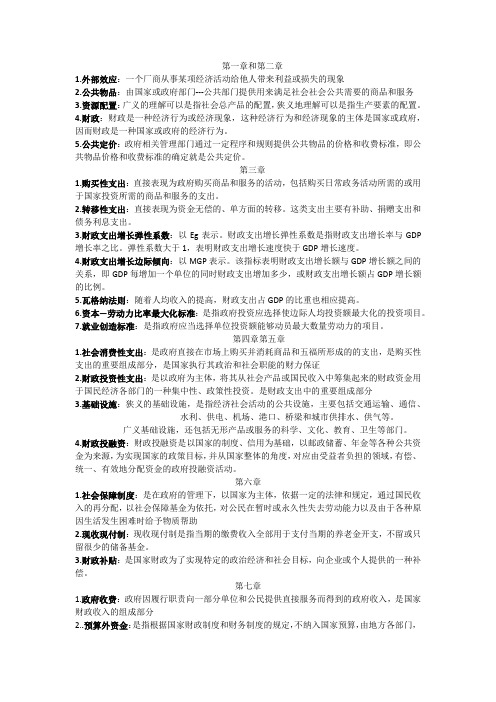
第一章和第二章1.外部效应:一个厂商从事某项经济活动给他人带来利益或损失的现象2.公共物品:由国家或政府部门---公共部门提供用来满足社会社会公共需要的商品和服务3.资源配置:广义的理解可以是指社会总产品的配置,狭义地理解可以是指生产要素的配置。
4.财政:财政是一种经济行为或经济现象,这种经济行为和经济现象的主体是国家或政府,因而财政是一种国家或政府的经济行为。
5.公共定价:政府相关管理部门通过一定程序和规则提供公共物品的价格和收费标准,即公共物品价格和收费标准的确定就是公共定价。
第三章1.购买性支出:直接表现为政府购买商品和服务的活动,包括购买日常政务活动所需的或用于国家投资所需的商品和服务的支出。
2.转移性支出:直接表现为资金无偿的、单方面的转移。
这类支出主要有补助、捐赠支出和债务利息支出。
3.财政支出增长弹性系数:以Eg表示。
财政支出增长弹性系数是指财政支出增长率与GDP 增长率之比。
弹性系数大于1,表明财政支出增长速度快于GDP增长速度。
4.财政支出增长边际倾向:以MGP表示。
该指标表明财政支出增长额与GDP增长额之间的关系,即GDP每增加一个单位的同时财政支出增加多少,或财政支出增长额占GDP增长额的比例。
5.瓦格纳法则:随着人均收入的提高,财政支出占GDP的比重也相应提高。
6.资本—劳动力比率最大化标准:是指政府投资应选择使边际人均投资额最大化的投资项目。
7.就业创造标准:是指政府应当选择单位投资额能够动员最大数量劳动力的项目。
第四章第五章1.社会消费性支出:是政府直接在市场上购买并消耗商品和五福所形成的的支出,是购买性支出的重要组成部分,是国家执行其政治和社会职能的财力保证2.财政投资性支出:是以政府为主体,将其从社会产品或国民收入中筹集起来的财政资金用于国民经济各部门的一种集中性、政策性投资。
是财政支出中的重要组成部分3.基础设施:狭义的基础设施,是指经济社会活动的公共设施,主要包括交通运输、通信、水利、供电、机场、港口、桥梁和城市供排水、供气等。
财政学名词解释
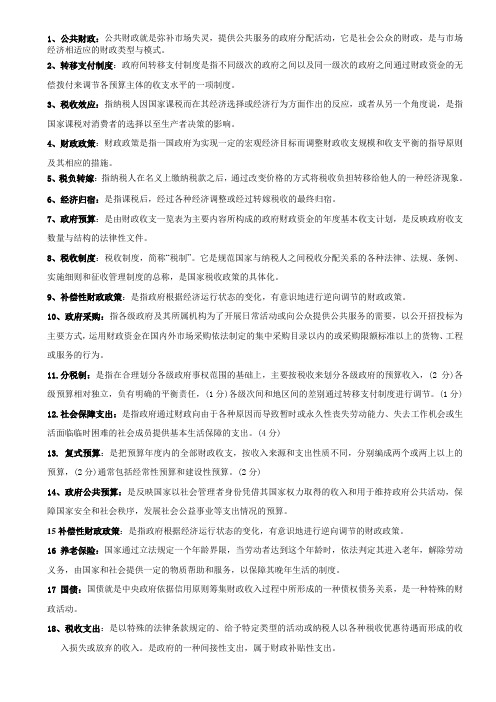
1、公共财政:公共财政就是弥补市场失灵,提供公共服务的政府分配活动,它是社会公众的财政,是与市场经济相适应的财政类型与模式。
2、转移支付制度:政府间转移支付制度是指不同级次的政府之间以及同一级次的政府之间通过财政资金的无偿拨付来调节各预算主体的收支水平的一项制度。
3、税收效应:指纳税人因国家课税而在其经济选择或经济行为方面作出的反应,或者从另一个角度说,是指国家课税对消费者的选择以至生产者决策的影响。
4、财政政策:财政政策是指一国政府为实现一定的宏观经济目标而调整财政收支规模和收支平衡的指导原则及其相应的措施。
5、税负转嫁:指纳税人在名义上缴纳税款之后,通过改变价格的方式将税收负担转移给他人的一种经济现象。
6、经济归宿:是指课税后,经过各种经济调整或经过转嫁税收的最终归宿。
7、政府预算:是由财政收支一览表为主要内容所构成的政府财政资金的年度基本收支计划,是反映政府收支数量与结构的法律性文件。
8、税收制度:税收制度,简称“税制”。
它是规范国家与纳税人之间税收分配关系的各种法律、法规、条例、实施细则和征收管理制度的总称,是国家税收政策的具体化。
9、补偿性财政政策:是指政府根据经济运行状态的变化,有意识地进行逆向调节的财政政策。
10、政府采购:指各级政府及其所属机构为了开展日常活动或向公众提供公共服务的需要,以公开招投标为主要方式,运用财政资金在国内外市场采购依法制定的集中采购目录以内的或采购限额标准以上的货物、工程或服务的行为。
11.分税制:是指在合理划分各级政府事权范围的基础上,主要按税收来划分各级政府的预算收入,(2分)各级预算相对独立,负有明确的平衡责任,(1分)各级次间和地区间的差别通过转移支付制度进行调节。
(1分) 12.社会保障支出:是指政府通过财政向由于各种原因而导致暂时或永久性丧失劳动能力、失去工作机会或生活面临临时困难的社会成员提供基本生活保障的支出。
(4分)13. 复式预算:是把预算年度内的全部财政收支,按收入来源和支出性质不同,分别编成两个或两上以上的预算,(2分)通常包括经常性预算和建设性预算。
财政学名词解释

1、财政的概念:“国家分配论”的财政概念:是以国家为主体的分配及其所形成的分配关系。
(暴力革命论)“公共需要论”的财政概念:财政是政府向市场提供公共产品和劳务的经济行为。
(契约论)A 公共性与阶级性:(阶级性是第一位,其次才是公共性)公共性①国家公共权力机关②满足公共需要 B 强制性与非直接偿还性。
C 收入与支出的对称性平衡性。
2、资源配置:广义:是指社会总产品的配置,狭义:生产要素的配置,其核心为效率问题,而效率问题又是资源的使用方法和使用结构问题。
3、公共物品:公共部门提供用来满足社会公共需要的商品和服务,其具有非排他性和非竞争性,分为①纯公共物品:既具有非竞争性也具有非排他性的公共物品,任何人均可以进行消费的物品)②准公共物品:只具有非竞争性或只具有非排他性的公共物品(指多一个人消费并不会增加成本)注:非排他性,一些人享有公共物品带来的利益而不能排除其他一些人同时从公共物品中获取的利益。
非竞争性,即消费者的增加不断增加不引起生产成本的消费或者说公众物品的边际成本为0。
4、财政支出:①购买性支出:指政府购买商品和服务的支出②转移性支出:是指政府资金,无偿的单方面的转移。
①购买性支出体现市场性再分配,政府支出形成商品和劳务的交换,转移性支出体现非市场性再分配,没有将换发生②政府直接参与经济活动,对生产和就业有直接影响,对分配的影响是间接的,转移性支出对生产就业间接影响,但直接影响分配。
③购买性支出的安排,对政府的安排会产生较强的硬约束,转移性支出是一种软约束。
(有与没有,补贴现率变化都不确定。
5、财政投融资:是政府为实行一定的产业政策和其他政策目标,通过国家信用的方式筹集资金,由财政统一掌握管理,并根据国民经济和经济发展规划,以出资(入股)或融资(贷款)方式,将资金投向急需发展的部门企业或事业的一种资金融通活动,也称“政策性金融”。
6、社会保障:指国家通过立法,以国民收入再分配为手段,对社会成员的基本生活提供了保障的行为和制度。
财政学名词解释
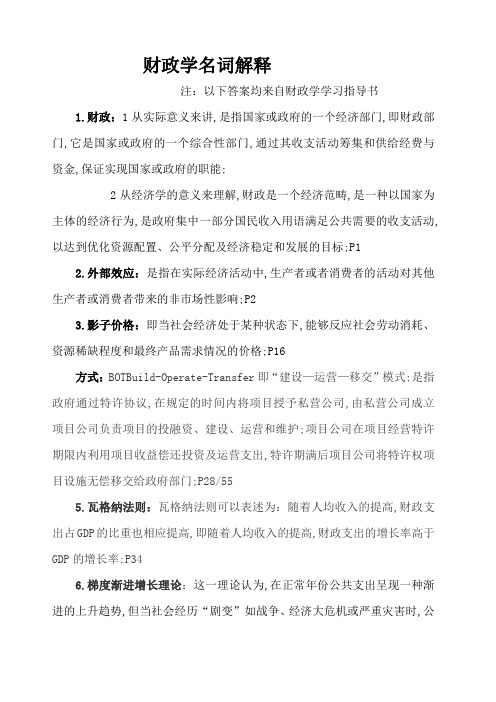
财政学名词解释注:以下答案均来自财政学学习指导书1.财政:1从实际意义来讲,是指国家或政府的一个经济部门,即财政部门,它是国家或政府的一个综合性部门,通过其收支活动筹集和供给经费与资金,保证实现国家或政府的职能;2从经济学的意义来理解,财政是一个经济范畴,是一种以国家为主体的经济行为,是政府集中一部分国民收入用语满足公共需要的收支活动,以达到优化资源配置、公平分配及经济稳定和发展的目标;P12.外部效应:是指在实际经济活动中,生产者或者消费者的活动对其他生产者或消费者带来的非市场性影响;P23.影子价格:即当社会经济处于某种状态下,能够反应社会劳动消耗、资源稀缺程度和最终产品需求情况的价格;P16方式:BOTBuild-Operate-Transfer即“建设—运营—移交”模式;是指政府通过特许协议,在规定的时间内将项目授予私营公司,由私营公司成立项目公司负责项目的投融资、建设、运营和维护;项目公司在项目经营特许期限内利用项目收益偿还投资及运营支出,特许期满后项目公司将特许权项目设施无偿移交给政府部门;P28/555.瓦格纳法则:瓦格纳法则可以表述为:随着人均收入的提高,财政支出占GDP的比重也相应提高,即随着人均收入的提高,财政支出的增长率高于GDP的增长率;P346.梯度渐进增长理论:这一理论认为,在正常年份公共支出呈现一种渐进的上升趋势,但当社会经历“剧变”如战争、经济大危机或严重灾害时,公共支出会急剧上升;当“剧变”期结束之后,公共支出水平会下降,但不会低于原来的水平;导致公共支出增长的内在因素是人们“可容忍税收水平”的提高;在正常年份人们可容忍税收水平比较稳定,公共支出不可能有较大幅度的上升,但随着经济的增长,即使税率不变,税收收入也会自动增加,相应的公共支出水平会大大提高,从而使公共支出大幅度地上升;当社会“剧变”时期结束之后,公共支出水平就会下降,但政府会设法维持可容忍税收水平,结果公共支出水平虽有下降,但不会回复到原来的水平;P347.现收现付制:指当期的缴费收入全部用于支付当期的养老金,不留或只留很少的储备基金;P708.完全基金制:指当期缴费收入全部用于为当期缴费的受保人建立养老储备基金,建立储备基金的目标应当是为满足未来向全部受保人支付养老金的资金需要;P709.“档次爬升”效应:以累进所得税为主题的税制,纳税人适用的税率,会随着名义收入增长而提高,即出现所谓“档次爬升”效应,会随着名义收入下降而降低档次,从而财政在价格再分配中所的份额将有所减少;P8110.起征点:起征点指税法规定的对课税对象开始征税的最低界限,收入未达起征点的低收入者不纳税,收入超过起征点的高收入者按全部课税对象纳税;P9211.税负转嫁:税负转嫁是指商品交换过程中,纳税人通过提高销售价格或压低购进价格的方法,将税负转移给购买者或供应者的一种经济现象;P9112.黄宗羲定律:明末清初的思想家黄宗羲在研究历代赋税制度更迭演变的基础上发现:每次农村税费改革,农民负担在下降一段时间后,由于种种原因,反而会涨到一个比改革之前更高的水平,走向了原先改革目的的反面;P12113.复式预算:指国家财政收支计划通过两个以上的计划表格来反应,一般分为经常预算和建设预算或债务预算P16414.零基预算:是指计划财政年度预算分项支出指标的确定,只以对社会经济发展的预测和当年各部门新增任务的审核为依据,不考虑以前财政年度各项支出的基数;P16515.粘蝇纸效应:由于参加公共决策的人的偏好不同,而且在公共决策中的影响力也不同,一些人可以通过对公共决策的影响使得中央的补助“粘”在政府部门中,而不是理论上分析的那样,像一个人那样在公共物品和私人物品之间寻找一个效用最大化的配置状态;经济学家把这种现象称为“粘蝇纸效应”即上级政府的一般定额补助被“粘”在公共物品上;P18016.专项拨款:是一种与无条件的均衡拨款相对应的有条件的指定用途的拨款,是转移支付的辅助形式;P18017.铸币税:也称为“货币税”;指发行货币的组织或国家,在发行货币并吸纳等值黄金等财富后,货币贬值,使持币方财富减少、发行方财富增加的经济现象;这个财富增加方,通常是政府;P19218.结构性赤字:是由政府财政政策的变量决定的,是一种外生标量,体现财政政策变量对经济的影响;P19219.相机抉择的财政政策:意味着这种决策本身不具有内在的调节功能,需要借助外力才能对经济产生调节作用;P20620.汲水政策:是一种诱导景气复苏的政策,是意经济本身所具有的的自发恢复能力为前提的治理萧条政策;P20621.出口退税制度:是指一个国家或地区对已报关离境的出口货物,由税务机关根据本国税法规定,将其在出口前生产和流通各环节已经缴纳的国内增值税或消费税等间接税税款,退还给出口企业的一项税收制度;P224。
- 1、下载文档前请自行甄别文档内容的完整性,平台不提供额外的编辑、内容补充、找答案等附加服务。
- 2、"仅部分预览"的文档,不可在线预览部分如存在完整性等问题,可反馈申请退款(可完整预览的文档不适用该条件!)。
- 3、如文档侵犯您的权益,请联系客服反馈,我们会尽快为您处理(人工客服工作时间:9:00-18:30)。
Public finance:The field of economics that analyzes government taxation and spending policies.
Experimental study: An empirical study in which individuals are randomly assigned to the treatment and control groups.
Observational study: An empirical study that relies on observed data that are not obtained from an experimental setting
Welfare economics:The branch of economic theory concerned with the social desirability of alternative economic states.
Contract curve: The locus of all Prateto efficient points.
Social welfare function :A function reflecting society's views on how the utilities of its members affect the well-being of society as a whole. Asymmetric information: A situation in which one party engaged in an economic transaction ha better information about the food or service traded than the other party.
Pure public good: A commodity that is nonrival and nonexcludable in consumption.
Free rider: The incentive to let other people pay for a public good while you enjoy the benefits.
Externality: An activity of one entity that affects the welfare of another entity in a way that is outside the market mechanism.
Coase Theorem: Provided that transaction costs are negligible, an efficient solution to an externality problem is achieved a long as someone
is assigned property rights, independent of who is assigned those rights. Pigouvian tax: A tax levied on each unit of an externality-generator's output in an amount equal to the marginal damage at the efficient level of output.
Tax wage: The tax-induced difference between the price paid by consumers and the price received by producers.。
